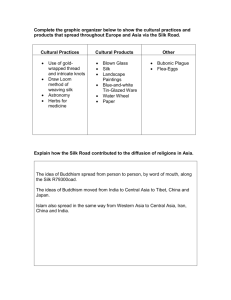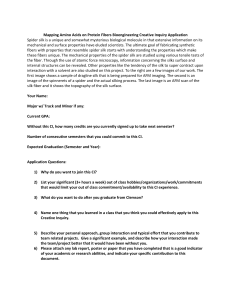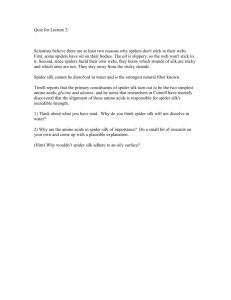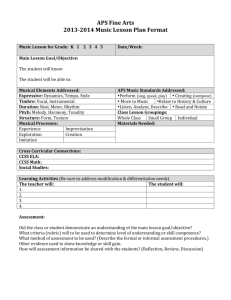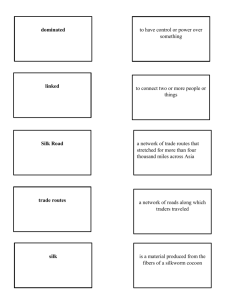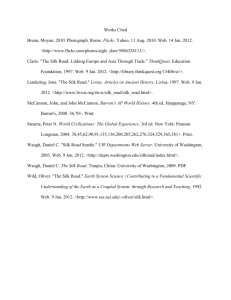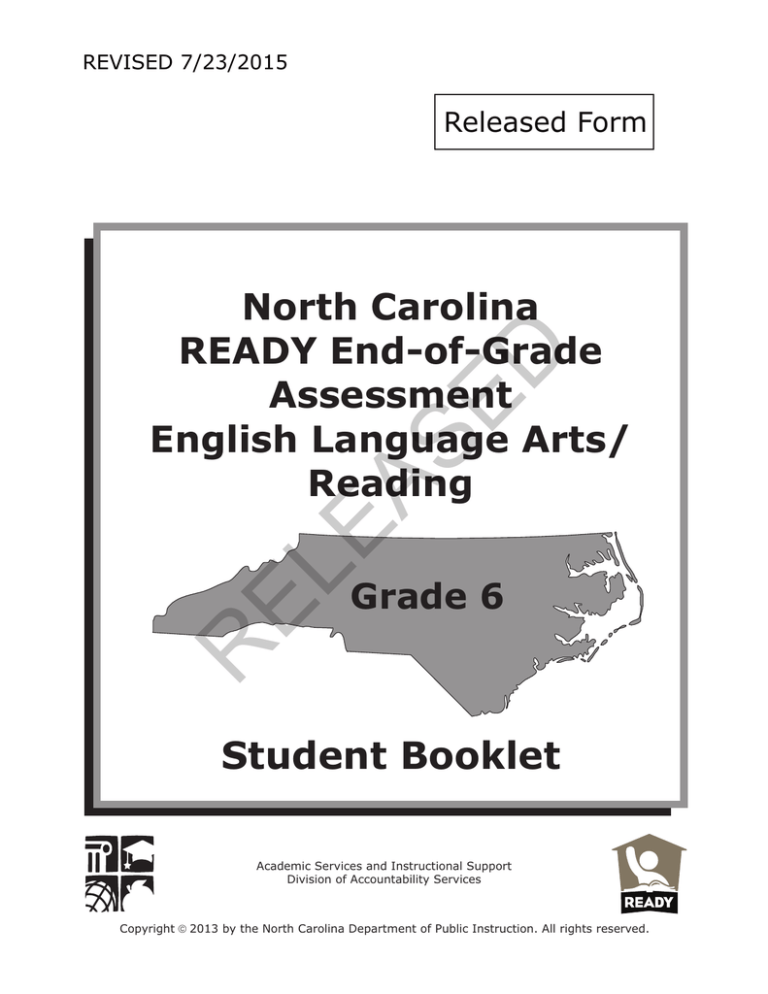
REVISED 7/23/2015
Released Form
EL
EA
SE
D
North Carolina
READY End-of-Grade
Assessment
English Language Arts/
Reading
R
Grade 6
Student Booklet
Academic Services and Instructional Support
Division of Accountability Services
Copyright ã 2013 by the North Carolina Department of Public Instruction. All rights reserved.
GRADE 6 ENGLISH LANGUAGE ARTS/READING—RELEASED FORM
Sample Questions
Song (1914)
by Rupert Brooke
D
All suddenly the wind comes soft,
And Spring is here again;
And the hawthorn quickens with buds of green,
And my heart with buds of pain.
SE
5 My heart all Winter lay so numb
EA
The earth is dead and frore,*
That I never thought the Spring would come,
Or my heart wake any more.
But Winter’s broken and earth has woken,
10 And the small birds cry again;
EL
And the hawthorn hedge puts forth its buds,
And my heart puts forth its pain.
frore: frozen
R
*
1
Go to the next page.
GRADE 6 ENGLISH LANGUAGE ARTS/READING—RELEASED FORM
A
The speaker’s heart is cheerful.
B
The speaker’s heart is afraid.
C
The speaker’s heart is paralyzed.
D
The speaker’s heart is extremely warm.
D
In the second stanza, how does the poet’s choice of words impact the meaning of
the poem?
The words tell the differences between the types of birds.
B
The words describe how cold it gets when seasons change.
C
The words explain how the speaker views all of the seasons.
D
The words emphasize the despair the speaker feels.
EA
SE
A
EL
S2
What can be inferred from line 5?
R
S1
2
GRADE 6 ENGLISH LANGUAGE ARTS/READING—RELEASED FORM
Liam McLafferty’s Choice
by Alexis O’Neill
No young lad in Ireland made worse choices than Liam McLafferty of Rosmuck.
When his brother asked, “Would you rather have this apple or that apple?” Liam chose
the one that spoiled first.
D
When his mother asked, “Would you like to spread manure or milk the cow?” Liam chose
to spread manure.
SE
When his father asked, “Would you like to come with me to the Galway fair or stay and
mind the wee ones?” Liam chose to stay.
When his schoolmaster asked, “Would you like to stand in the corner or sit beside rough
Kieran O’Keefe?” Liam chose to sit beside rough Kieran.
EL
EA
6
Try as he might, Liam could not make a good choice. On market day, his mother
endeavored to teach him. “There now, Liam,” she said. “Look at those three pigs. Which
should we take home with us?”
Liam examined them closely, as all farmers did. Each pig was round and noisy. Each one
would make a fine dinner. But each one looked him square in the face.
R
“I’ll take that sack of potatoes,” said Liam, and he covered his eyes as he walked away
from his mother’s side.
On race day, his father tried to teach him. “Look at all the fine horses. Which will cross
the finish line first?” Like his father, Liam slid his hands along the horses’ withers. He
talked with the riders.
“The wee red mare,” said Liam. When the wee red mare crossed the finish line last, Liam
covered his ears to block the men’s laughter.
One night, Liam heard his parents whispering by the hearth. “Liam is our oldest lad,” his
father said, “yet how can we leave our field to him? Sure, the land will be lost if Liam
puts his hand to it.”
3
Go to the next page.
GRADE 6 ENGLISH LANGUAGE ARTS/READING—RELEASED FORM
Liam’s heart broke. Before the sun rose, he walked past the fields to the sea to think. As
it happened, he spied two figures upon the beach in the rosy dawn.
“Lend a hand, would you?” called a beautiful colleen* as she tugged on her great green
cloak, which was caught in the rocks.
“Lend a hand, would you?” croaked an old woman as she tried to hobble up a narrow
path in her black shawl and red skirt.
D
Now, any other young man would have raced to help the beautiful girl. But not Liam
McLafferty. Without so much as a second thought, he raced to the side of the wrinkled
old woman.
SE
At the top of the path, the old woman turned to him. “Tell me, Liam McLafferty, why did
you choose to help me when you might have had that lovely colleen on your arm
instead?”
EA
Liam was stunned. In all his life, no one had ever asked him why he had chosen the way
he had. The wind blew soft against his face as he stood above the rolling sea.
“Now that you ask,” he said, “I thought that a young colleen might be able to free her
own self from the rocks. I thought that an old woman might have more use of my arm
climbing up a craggy hill.”
EL
“And the apple?” asked the woman as she rested against a rock.
R
“The riper the apple, the more ready the seeds are for planting,” he said without
stopping to wonder how she knew about the spoiled apple.
“The manure?” she asked.
“Why, it helps things to grow,” Liam replied.
“And why stay with the wee ones when you could have gone to the fair?” she persisted.
“They need my stories so they might tell their own someday,” he said. Then he thought
about his other choices. “I sat beside rough Kieran, for who else would befriend him? As
for the potatoes, don’t they nourish a family without harming a pig? And the wee red
mare—well, now, I suppose I saw what she might become instead of what she was that
day.”
*
colleen: an Irish girl
4
Go to the next page.
GRADE 6 ENGLISH LANGUAGE ARTS/READING—RELEASED FORM
25
The old woman nodded as she stood on the path. Then quick as a hare, she spun around
until she was but a blur of black and red. When the spinning stopped, there before Liam
stood the queen of the fairy kingdom.
“Liam, for listening to your heart’s own good sense above others’ opinions, you may
choose your reward.”
Och! Poor Liam! Another choice to make!
SE
D
Think hard, he whispered to himself. What would a smart Irish lad choose? A room of
gold! he thought. Now, wouldn’t that make Da happy. Oh, better! A village full of
friends! Now, wouldn’t that make Ma proud. Liam thought these things, but he said
nothing. He was afraid of being laughed at once again.
The fairy queen tapped her delicate foot. “Come, now, Liam. No choice is a choice, too.”
EA
30
Liam found his voice. “All I ask is a wee dram of knowledge and the wisdom to make
good choices,” he said, then cringed, afraid that the fairy queen would mock him.
EL
31
“’Tis yours, as it has always been. Trust it,” she said and disappeared.
When Liam arrived at his cottage, there on his cot was a wee slip of parchment. On it
were two words: TELL THEM.
R
The village soon spilled with tales of Liam McLafferty and the fairy queen. The laughter
followed. What young man with any sense would choose a wisp of parchment over a
fortune in gold?
Och. But Liam knew the half of it. For as he soon discovered, the words he carried with
him gave him courage. With each choice he made, he explained the whys and
wherefores of it. And there wasn’t a reason that didn’t make good sense to the others.
As it happened, the young colleen in the great green cape soon became his wife. With
her love and his heart’s own good sense to guide him, he made his father’s land
prosper. Villagers came to him for advice, and his hearth never lacked for a friendly
face.
Truth be told, as the years passed, all the villagers came to agree on one thing: no
5
Go to the next page.
GRADE 6 ENGLISH LANGUAGE ARTS/READING—RELEASED FORM
young lad in the whole long history of Ireland ever made better choices than Liam
McLafferty of Rosmuck.
3
It explains that Liam’s mother struggled to assist him.
B
It explains that Liam was afraid to make a decision.
C
It shows that Liam became excited about decisions.
D
It shows that Liam’s mother lacked the desire to help.
SE
D
A
EA
What does the author mean by saying that the old woman “tried to hobble up a
narrow path”?
A
The old woman was walking carefully.
B
The old woman was enjoying walking.
C
The old woman was walking briskly.
D
The old woman was having difficulty walking.
EL
2
How does endeavored affect the meaning of paragraph 6?
R
1
What did the fairy queen do that Liam’s parents failed to do?
A
She gave Liam love, care, and affection.
B
She showed Liam the best way to make a decision.
C
She asked Liam about the reasons for his choices.
D
She offered to take Liam to the Galway fair.
6
Go to the next page.
GRADE 6 ENGLISH LANGUAGE ARTS/READING—RELEASED FORM
He wanted to please his teacher.
B
He wanted to please his parents.
C
He was afraid of Kieran.
D
He felt sorry for Kieran.
D
What is the effect of the simile in paragraph 25?
to show how surprised Liam was to see fairy queen
B
to describe the speed of the old woman’s movements
C
to explain how much the fairy queen liked Liam’s choices
D
to illustrate that Liam was confused by the old woman
SE
A
EA
6
A
What is the meaning of cringed in paragraph 30?
A
raised eyebrows questioningly
B
moved forward confidently
C
hunched shoulders anxiously
D
laughed jokingly
EL
5
Why did Liam choose to sit beside Kieran at school?
R
4
7
Go to the next page.
GRADE 6 ENGLISH LANGUAGE ARTS/READING—RELEASED FORM
A
Liam’s cheerful personality
B
Liam’s ability to make choices
C
the fairy queen’s magical power
D
the fairy queen’s good sense
D
In the selection, how does the town’s view of Liam change from the beginning to
the end?
The townspeople worship him and then disown Liam when they find out he is
dishonest.
B
The townspeople despise him and then regret how they treated Liam when
he becomes famous.
C
The townspeople mock him and then realize Liam is the one who makes the
wisest decisions.
D
The townspeople pity him and then betray Liam when they realize he helped
a stranger.
EA
SE
A
EL
8
In paragraph 31, to what is the fairy queen referring?
R
7
8
Go to the next page.
GRADE 6 ENGLISH LANGUAGE ARTS/READING—RELEASED FORM
Gustave Eiffel, Architect of the Eiffel Tower
by Lindsey Chapman
An engineer who helped bring the world some of its most recognizable landmarks,
Gustave Eiffel is best known for his eponymous1 Parisian tower. Eiffel’s creations can be
found on several continents.
Gustave Eiffel’s Early Days
SE
D
Alexandre Gustave Eiffel, more commonly known as Gustave Eiffel, was born Dec. 15,
1832, in Dijon, France. He was a civil engineer who gained renown for designing bridges
and other structures around the world. After graduating from the College of Art and
Manufacturing, he specialized in metal construction, working primarily on bridges like
the iron bridge in Bordeaux, France. He also engineered the framework for the Statue of
Liberty.
EL
EA
In 1887, Eiffel agreed to his largest project ever: building locks in the Panama Canal.
Although large in potential, the end result was a monumental financial scandal—the
largest of the century. When Eiffel began work on the locks, he started collecting profits.
The project was risky, so he was offered some financial guarantees. The company
helping with construction was liquidated2 in 1889, however. Eiffel was subsequently
indicted3 for fraud along with the company manager and sentenced to prison, although
he couldn’t be held personally accountable for failures on the job. Eventually the ruling
against Eiffel was annulled.
R
Eiffel’s Notable Accomplishments
4
The Eiffel Tower was built to serve as a focal point for the Paris Centennial Exposition of
1889. When Eiffel set out to construct this monument, the idea behind it wasn’t entirely
fresh. American engineers had already designed a tower for Philadelphia’s 1876
Centennial Exposition, but never built it. Even the concept behind the tower wasn’t all
Eiffel’s. Another engineer proposed the initial Eiffel Tower sketch, drawing inspiration
from bridges Eiffel himself had already designed. Artists in Paris protested the tower,
calling it “vertiginously4 ridiculous” and “barbarous.”
1
eponymous: giving one’s name to a place or work (book, film, etc.)
liquidated: sold to settle business debts
3
indicted: charged with a crime
4
vertiginously: producing dizziness
2
9
Go to the next page.
GRADE 6 ENGLISH LANGUAGE ARTS/READING—RELEASED FORM
Although he couldn’t understand the criticism surrounding the project, Eiffel’s work was,
of course, completed. When it was finished, the tower was the tallest structure in the
world, the next closest being the 555-foot Washington Monument. At one point, Eiffel
said, “I ought to be jealous of the tower, it is much more famous than I am.”
The Rest of the Story
D
Gustave Eiffel was 91 years old when he died in December 1923. He remained proud of
his work, and the Eiffel Tower in particular. There came a point, however, when Eiffel’s
“name and the monument became one and the same, while the man behind the
masterpiece gradually disappeared in the towering shadow of his creation,” according to
the Paris Eiffel Tower News.
EL
Which statement summarizes the selection?
A
The Eiffel Tower, designed in 1889 by Gustave Eiffel, stands today as an
iconic Paris landmark.
B
Gustave Eiffel was an engineer who designed many bridges and structures,
including the Eiffel Tower.
C
Gustave Eiffel died in 1923 and is remembered for designing the “one-hit
wonder” Eiffel Tower.
D
Engineer Gustave Eiffel was indicted for fraud while building locks in the
Panama Canal.
R
9
EA
SE
Blogger Tony Wheeler said it’s easy to consider Eiffel a “one-hit wonder” and forget that
he created more than just the Eiffel Tower. In fact, Wheeler noted, he’s encountered
many Eiffel creations on his world travels. In Gabon, Wheeler visited the St. Anne
Mission. While there is some doubt that this mission is an Eiffel design, he said “it
certainly has the Eiffel feel.” Eiffel also designed the Pont Faidherbe Bridge in St Louis,
Senegal, and the Long-Bien Bridge in Hanoi, Vietnam, which was bombed repeatedly
during the Vietnam War, but has been repaired and is still used today.
10
Go to the next page.
GRADE 6 ENGLISH LANGUAGE ARTS/READING—RELEASED FORM
The Introduction
B
Gustave Eiffel’s Early Days
C
Eiffel’s Notable Accomplishments
D
The Rest of the Story
According to the selection, which statement is true?
The Eiffel Tower was originally to be built next to the Panama Canal.
B
Gustave Eiffel’s designs for the Eiffel Tower were original and widely
accepted.
C
Gustave Eiffel was sentenced to prison for fraud on his work on the Statue of
Liberty.
D
The Eiffel Tower was built to serve as a focal point for the Paris Centennial
Exposition of 1889.
SE
D
A
EA
12
A
Based on the last sentence in the paragraph 4, what does the word barbarous
emphasize?
EL
11
Which section of the selection summarizes the text?
A
disapproval and negative feelings
B
happiness and contentment
C
gratitude for a job well done
D
that an object is too expensive for what it is worth
R
10
11
Go to the next page.
GRADE 6 ENGLISH LANGUAGE ARTS/READING—RELEASED FORM
15
“Artists in Paris protested the tower, calling it ‘vertiginously ridiculous’ and
‘barbarous.’ ”
B
“He couldn’t understand the criticism surrounding the project.”
C
“ ‘I ought to be jealous of the tower, it is much more famous than I am.’ ”
D
“ ‘The man behind the masterpiece gradually disappeared in the towering
shadow of his creation.’ ”
D
A
SE
What did blogger Tony Wheeler mean by the phrase, “one-hit wonder” in the last
paragraph?
to only hit one home-run in baseball
B
to be popular for one specific accomplishment
C
to question who was responsible
D
to judge someone by their strength and power
EA
A
EL
14
Which quote from the selection is the example of Gustave Eiffel’s point of view?
How does the author support her claim that Gustave Eiffel’s creations can be found
on several continents?
A
by naming every bridge that Gustave Eiffel built
B
by listing all the masterpieces constructed by Gustave Eiffel
C
by including structures such as St. Anne Mission and Pont Faidherbe Bridge
in the selection
D
by explaining the design for Philadelphia’s 1876 Centennial Exposition
R
13
12
Go to the next page.
GRADE 6 ENGLISH LANGUAGE ARTS/READING—RELEASED FORM
How does the selection support the idea that Gustave Eiffel is best known for his
tower?
It describes Eiffel’s early work as a civil engineer.
B
It contrasts Eiffel’s tower in Paris with the one planned in Philadelphia.
C
It details how his career was damaged through constant scandal.
D
It states that Eiffel’s name and the monument became one and the same.
EL
EA
SE
D
A
R
16
13
Go to the next page.
GRADE 6 ENGLISH LANGUAGE ARTS/READING—RELEASED FORM
Be a Friend
by Edgar A. Guest
D
Be a friend. You don’t need money;
Just a disposition sunny;
Just the wish to help another
Get along some way or other;
5 Just a kindly hand extended
Out to one who’s unbefriended;
Just the will to give or lend,
This will make you someone’s friend.
EA
SE
Be a friend. You don’t need glory.
10 Friendship is a simple story.
Pass by trifling errors blindly,
Gaze on honest effort kindly,
Cheer the youth who’s bravely trying,
Pity him who’s sadly sighing;
15 Just a little labor spend
On the duties of a friend.
R
EL
Be a friend. The pay is bigger
(Though not written by a figure)
Than is earned by people clever
20 In what’s merely self-endeavor.*
You’ll have friends instead of neighbors
For the profits of your labors;
You’ll be richer in the end
Than a prince, if you’re a friend.
*
self-endeavor: an attempt to achieve
a goal or task on one’s own
14
Go to the next page.
GRADE 6 ENGLISH LANGUAGE ARTS/READING—RELEASED FORM
Being a friend is easy, and the rewards are great.
B
Being a friend is fun, and it takes very little time.
C
Being a friend is boring, and it is too difficult.
D
Being a friend is a big burden, and it takes a lot of time.
someone having many enemies
B
someone having many friends
C
someone having no enemies
D
someone having no friends
SE
A
D
Based on the poem, what is the meaning of unbefriended in line 6?
EA
19
A
What is the meaning of line 10?
A
Being a friend is its own reward.
B
Being a friend is a difficult task.
C
Being a friend is not hard work.
D
Being a friend is not forgotten.
EL
18
What is the central idea of the poem?
R
17
15
Go to the next page.
GRADE 6 ENGLISH LANGUAGE ARTS/READING—RELEASED FORM
It suggests that being a friend means overlooking flaws.
B
It suggests that being a friend means giving up riches.
C
It suggests that being a friend means overcoming obstacles.
D
It suggests that being a friend means helping those in need.
D
Which statement describes how the first and third stanzas have similar central
ideas?
Both suggest it is better to give than receive.
B
Both suggest wealth attracts the unbefriended.
C
Both suggest money comes between friends.
D
Both suggest friendship is the greatest wealth.
SE
A
EA
22
A
How is the third stanza different from the two previous stanzas?
EL
21
How does line 11 contribute to the poem’s theme?
A
The third stanza tells the reader how to be a good friend.
B
The third stanza tells the reader the benefits of being a friend.
C
The third stanza does not rhyme, but the other two stanzas rhyme.
D
The third stanza rhymes, but the other two stanzas do not rhyme.
R
20
16
Go to the next page.
GRADE 6 ENGLISH LANGUAGE ARTS/READING—RELEASED FORM
Silk’s Superpowers
by Rachel Ehrenberg
D
Spider-Man isn’t the only person with an interest in spider silk. While Spidey uses the
threads to zigzag from building to building, or to snare a bad guy, scientists are
investigating silk for different reasons. And though researchers have learned a lot about
silk by investigating spiders, insects such as caterpillars, ants, and bees also have been
studied for the sticky stuff. Scientists are even trying to get silk from animals such as
goats.
EA
SE
It turns out silk might be good for weaving a lot more than shirts and ties. In the future,
the silky fiber might be used to make supertough bulletproof vests and light but strong
parachute cords. Silk also might work well for delicate tasks inside the body.
Researchers are experimenting with using silk to support growing cells, the same way a
construction crew builds scaffolding around a building to help keep everything in its
place during construction. Silk might be a good material to give growing cells something
to hang on to.
EL
Scientists think silk would be useful for so many things because it is both extremely
strong and very elastic—it can be stretched a long way without breaking. Most of today’s
strong, elastic fibers are made from petroleum products and there are harsh chemicals
in the recipes for these fibers. If scientists can figure out how natural silk makers make
their threads, the harsh chemicals might not be needed.
R
Spider silk is an ideal material, says Randy Lewis of the University of Wyoming in
Laramie. “If you can mimic it, you can eliminate an awful lot of the problems you have
with all the man-made fibers that are currently available.”
Humans have been gathering silk not from spiders but from silkworms for hundreds of
years. Silkworms aren’t worms at all, they are actually caterpillars, or the young, of the
silk moth. When it’s time for a silkworm to turn into a moth, the caterpillar spins itself a
cocoon out of one very, very long silk fiber. The thread from unraveling a single
silkworm cocoon can be 600 to 900 meters long! That’s more than two times the height
of the Empire State building!
Long ago, people learned how to raise silkworms together in farms. Silkworms don’t
mind being crowded together, as long as they have food, like mulberry leaves. In
addition to making a nice fabric for scarves and sheets, silkworm silk is also used by
doctors for stitching up cuts. But silkworm silk has its problems. A silkworm covers its
17
Go to the next page.
GRADE 6 ENGLISH LANGUAGE ARTS/READING—RELEASED FORM
silk in sticky glue that holds the cocoon together. Sometimes humans have a bad
allergic reaction to this glue. And silkworms spin only one kind of silk.
Spiders, on the other hand, don’t use a sticky glue. And spiders make many different
kinds of silk.
8
“We love the silkworm,” says David Kaplan of Tufts University in Medford, Mass., who
has been studying silk for many years. “But spider silk is so diverse—we want to exploit*
that.”
SE
D
Most spiders like to be alone. When they are crowded in one place they sometimes eat
each other. This makes it hard to have a “spider farm” for collecting silk. So scientists
are studying how spiders make silk, with the hope that the technique can be copied,
perhaps even in other animals.
EL
EA
Spiders are one of the oldest groups of animals on the planet—scientists have found
fossils of spiders that are 380 million years old. Although they are often mistaken for
insects, spiders, along with ticks, mites, and scorpions, are arachnids. Unlike insects,
spiders have eight legs, a two-piece body, and usually eight eyes of different sizes and
shapes. Spiders don’t have chewing mouthparts. Instead they have fang-tipped jaws
called chelicerae that are used to inject digestive enzymes into prey. These enzymes
break down prey from the inside out. Humans would be in trouble without spiders—they
eat many insects that people consider pests. And spiders are a very diverse
group—more than 37,500 species of spider have been described (consider that there
are only about 10,000 kinds of birds).
R
Most spiders have an abdomen made up of five different sections. The last two sections
are where the silk-making happens. These sections of the lower belly are modified into
special structures called spinnerets, which are sort of like faucets for silk. The silk is
mixed in glands and then secreted out of the spinnerets. Spiders can’t shoot silk out for
long distances the way Spider-Man does. Instead, they attach the emerging silk to
something, like a tree branch, and then move away from the branch. This pulls the silk
outward.
12
One spider usually has several different glands and spinnerets for making several
different kinds of silk. In their webs, most spiders use dragline silk for the outer rim and
spokes. Strong as steel, dragline silk is also used as a safety line when a spider falls
*
exploit: to use for one’s own purposes
18
Go to the next page.
GRADE 6 ENGLISH LANGUAGE ARTS/READING—RELEASED FORM
from a high shelf or branch. For the inner part of the web, where an insect such as a
buzzing fly might get caught, spiders use an extra sticky silk. They wrap these freshly
caught snacks in another silk, called aciniform silk. Spiders use another silk, one that is
very stiff, to wrap and protect their eggs.
Even spiders that don’t make proper webs make silk. Scientists recently discovered that
tarantulas, which use burrows instead of webs as homes, make silk from spigots on the
end of their feet!
SE
D
14
The most studied spider silks come from the golden silk spider, Nephila clavipes, and the
European garden spider, Araneus diadematus. A one-inch-diameter fiber made of
dragline spider silk could reel a 747 airplane from the sky, says Randy Lewis. The silk is
also light and thus an excellent material for things like body armor, parachute cords or
even tethering planes to an aircraft carrier.
EA
Spider silks also seem to be useful inside the human body, says Kaplan. For example,
scientists have made ultrathin films out of dragline silk that in the future might be used
as bandages for dressing wounds. Spider silk is also being used to make porous, or
holey, gels and sponges. When placed in these sponges, tissue, bone, and nerve cells
are held steady while they grow. These silk sponges will fall apart or degrade gradually,
after the cells have been given enough time to grow.
R
EL
The main ingredients in spider silk are proteins, and there are many different kinds,
depending on which spider is spinning and which silk it wants to make. Some of the
proteins are very large and complicated, and therefore hard to make a lot of in the lab.
So some scientists have put the genes that have the instructions for making silk into
other creatures, such as goats. Some of these special silk-making goats live at the
University of Wyoming. The silk-making genes are turned on only in the goat cells that
make milk, so when these goats are milked, there is silk in the milk. Right now, it is
hard to get a lot of silk in the milk, Lewis says. A liter of milk may have only 15 grams of
silk, which means it would take about 600 gallons of milk to make one bulletproof vest.
At higher concentrations the milk starts clumping, perhaps because the silk proteins are
sticking to milk proteins, Lewis says.
Tara Sutherland, of Australia’s Commonwealth Scientific and Industrial Research
Organization in Canberra, is focusing on silks made by insects other than silkworms.
Many insects make silk, although only one kind each. Sutherland has zeroed in on the
silks of bees, wasps, and ants.
“Imagine a hive and each new generation of bees being wrapped in a silken cocoon,”
19
Go to the next page.
GRADE 6 ENGLISH LANGUAGE ARTS/READING—RELEASED FORM
she says. “If you remove the wax and look where the bees were raised there is
silk—beautiful sheets of golden silk.”
The bee silk probably protects the baby bees in the hive, says Sutherland. Bee silk might
also add structural support to the hive and prevent the wax from getting so warm that it
melts.
Sutherland is also investigating weaver ants, which use silk to stitch leaves into nests. It
seems only the baby weaver ants make silk. The adults hold the little larval silk-makers,
moving them around for desired silk placement.
D
The silks made by stinging insects such as bees have a different structure from other
silks. It looks like spiraled pasta versus flat sheets of linguini, says Sutherland.
SE
And bee and ant silk is both tougher and more stable than silkworm silk, she says.
Though nothing beats spider silk, because bee silk is made of simpler proteins, it might
be easier for scientists to make in the large amounts needed to create everyday things
for humans.
Which statement summarizes the selection?
A
Scientists have learned a great deal from their study of silkworms and silk.
B
Spiders are fascinating and interesting arachnids.
C
Scientists are just beginning to discover the many uses of spider and insect
silk.
D
Silkworm silk is far superior to that made by spiders.
R
23
EL
EA
So watch out villains—Spidey may one day be upstaged by other silk spinners. Here’s to
Ant-Man, or The Bee.
20
Go to the next page.
GRADE 6 ENGLISH LANGUAGE ARTS/READING—RELEASED FORM
24
What is the meaning of the word mimic as used in the sentence below?
“ ‘If you can mimic it, you can eliminate an awful lot of the problems you have
with all the man-made fibers that are currently available.’ ”
stretch
C
copy
D
sell
D
B
colorful
B
different
C
similar
D
modern
EA
A
SE
Based on paragraph 8, what is the meaning of the word diverse?
EL
26
break
What is the central idea of paragraph 12?
A
It is important for spiders to use sticky silk to catch prey.
B
Spiders must use a stronger silk for the outline of their web.
C
It is important to have stiff silk to protect spider eggs.
D
Spiders are capable of creating a variety of silks for different needs.
R
25
A
21
Go to the next page.
GRADE 6 ENGLISH LANGUAGE ARTS/READING—RELEASED FORM
protein
B
milk
C
enzymes
D
glue
D
According to the selection, why are scientists studying a variety of
animal-produced silk?
to find a way to make silk less sticky
B
to produce a silk without the harsh chemicals in man-made fibers
C
to discover a silk strong enough to pull a fish from water
D
to find a way to make the spinning process shorter
SE
A
EA
29
A
How will the study of spider silk benefit human cells?
EL
28
What is the main ingredient in silk?
A
It can be used to replace weak or damaged cells.
B
It can provide a flexible, porous place for cells to move.
C
It provides a temporary structure for cells to thrive.
D
It provides a rigid and permanent home for cells.
R
27
22
Go to the next page.
GRADE 6 ENGLISH LANGUAGE ARTS/READING—RELEASED FORM
A
It allows the reader to imagine what a golden spider looks like.
B
It allows the reader to realize how strong spider silk is.
C
It informs the reader of the disadvantages of silk made by spiders.
D
It informs the reader of the scientific name of the garden spider.
D
Which explains the author’s purpose in writing this selection?
to inform the reader that silk might make good vests
B
to inform the reader about the chemical composition of silk
C
to inform the reader that different species of spiders spin silk differently
D
to inform the reader about the different types and uses of silk
EA
SE
A
EL
31
What is the impact of paragraph 14?
R
30
23
Go to the next page.
GRADE 6 ENGLISH LANGUAGE ARTS/READING—RELEASED FORM
The Totem Pole Challenge
by The TaleWagger
One day last summer, a grandfather was sitting on a pier with his grandson fishing.
D
It was a warm, sunny day and several people were out and about, enjoying the fine
weather, the scenery and relaxing. On a seat, near to the grandson, a young woman
was reading a book and when she had finished she wandered away, leaving the book on
the seat. After a while, the grandson, bored with not being able to catch a fish, strolled
across to the seat and picked up the book.
SE
He quickly flicked through the pages, decided that it was of no interest to him, and
proceeded to tear out the pages, one by one. When he had sufficient, he went to the
water’s edge. There he proceeded to screw them into balls and throw them into the
water.
EA
“Mike!” his grandfather shouted out. “What do you think you’re doing?”
“Nothin’ Grandpa,” came the reply, “just playing with an old book someone left behind.”
EL
“Don’t be destructive,” scolded his grandfather, “someone will have to clear up your
mess. More importantly though, you should realize that some author must have taken a
lot of trouble to write that book.”
R
“But it was only an old book Grandpa,” replied Mike, “and anyway, anyone can write a
book. It’s easy!”
The old man sighed, gave an old-fashioned look, and asked. “Have you heard the story
of the Totem Pole Challenge?”
Mike shook his head.
“In that case, you’d better sit down and listen carefully.”
With the fishing forgotten for a while, Mike sat cross-legged on the ground and his
grandfather began his tale.
“Many years ago, a small tribe lived deep in the wilderness of North America. One day
the Chief met with his three sons and spoke.
24
Go to the next page.
GRADE 6 ENGLISH LANGUAGE ARTS/READING—RELEASED FORM
‘I have decided that we should leave the story of our lives for others to see. When the
snow melts, I will trade half of our pelts with the woodcarvers, for a totem pole.’
At first his sons could not believe what they had heard and looked at each other in
amazement.
‘But father,’ they cried out as one, ‘if you do that, we will not have enough pelts to trade
for food and we will surely die! We have tomahawks and there are many trees. We can
make as many totem poles as you want!’
D
16
The Chief was not convinced but paused for a moment to consider. However, his sons
were adamant.
SE
‘Anybody can make a totem pole, it’s easy!’ they chanted.
‘Anybody can make a totem pole, it’s easy!’
EA
Finally the Chief gave in and agreed that, come the springtime, they could each make a
totem pole. The elders of the tribe would then select the best one and it would stand in
the middle of their village and the history of the tribe would be carved upon it.
EL
The first son spent the winter sheltering from the cold, stayed close to the settlement,
and carried on doing the things that he had always done in the winter.
R
The second son spent most of his spare time making his tomahawk into the finest and
sharpest one in the village, and thinking about where the most suitable tree might be
growing.
The third son traveled afar, through the deep snow of the inhospitable countryside, to
seek out the wigwams of the totem pole makers.
He spent the winter learning how they selected the trees, the tools they used and the
history of totem pole making. Finally, on the way back to his village he visited the finest
totem poles in the area.
When the first day of spring arrived, the three sons set about the task of carving their
totem poles. By the end of the first week the third son had finished and everyone in the
tribe agreed that he had carved a magnificent totem pole, fit to stand in the middle of
any village. At the end of the first month, the second son had finished and the villagers
agreed that he had done a neat job, but it looked more like a canoe than a totem pole!
25
Go to the next page.
GRADE 6 ENGLISH LANGUAGE ARTS/READING—RELEASED FORM
25
By the end of spring, the first son had finished and the villagers were unanimous that,
thanks to his efforts at carving, there would be enough firewood for many years to
come!
You see Mike, everything done properly is never as ‘easy’ as it first seems!”
Never read books and leave them unattended.
B
Hard work done properly pays off in the end.
C
Rushing through your work may sometimes be necessary.
D
Do not discard books, as it takes too long to write them.
EA
SE
D
A
Which quote from the selection illustrates the central idea of the selection?
A
“In that case, you’d better sit down and listen carefully.”
B
“ ‘I have decided that we should leave the story of our lives for others to
see.’ ”
C
“ ‘Anybody can make a totem pole, it’s easy!’ they chanted.”
D
“You see Mike, everything done properly is never as ‘easy’ as it first seems!”
EL
33
Which statement summarizes the theme of this selection?
R
32
26
Go to the next page.
GRADE 6 ENGLISH LANGUAGE ARTS/READING—RELEASED FORM
35
In the selection, why did the Chief believe that the village should have a totem
pole?
A
The totem pole would be a record of the village history.
B
The neighboring villages each had totem poles.
C
The totem pole would make his sons famous.
D
His sons needed to learn to find good totem pole wood.
Based on the sentence below from paragraph 16, what does the word adamant tell
the reader about how the sons felt?
D
34
The sons were confused at the dilemma.
B
The sons were annoyed at their father.
C
The sons were firm in their opinions.
D
The sons were delighted at the challenge.
EL
EA
A
In the selection, what was the grandfather trying to teach his grandson by telling
the fable?
R
36
SE
“However, his sons were adamant.”
A
No one should ever destroy another person’s property.
B
Writing a book is much more difficult than creating a totem pole.
C
People gain more appreciation for the value of something when they have
tried to create it.
D
Books and totem poles are valuable and should be preserved and shared for
historical purposes.
27
Go to the next page.
GRADE 6 ENGLISH LANGUAGE ARTS/READING—RELEASED FORM
37
In the sentence below, what does the word inhospitable mean?
39
unfriendly
B
unimpressive
C
unimportant
D
unhealthy
SE
What purpose is served by paragraph 25?
It describes how the third son was thanked by the village for creating a
totem pole.
B
It explains that the first son was the last son to complete a village totem
pole.
C
It describes how the first son brought firewood to the village instead of
creating a totem pole.
D
It explains that the first son’s totem pole was a reflection of his preparation
during the winter.
EL
EA
A
R
38
A
D
“The third son traveled afar, through the deep snow of the inhospitable
countryside, to seek out the wigwams of the totem pole makers.”
Based on the selection, what does the American Indian culture value?
A
the talent and commitment needed to create something lasting
B
the ability to prepare for and complete a task quickly
C
helping the community overcome challenges caused by nature
D
helping senior citizens feel like they are a part of the community
28
Go to the next page.
GRADE 6 ENGLISH LANGUAGE ARTS/READING—RELEASED FORM
Be a Fit Kid
There’s a lot of discussion these days about fit kids. People who care (parents, doctors,
teachers, and others) want to know how to help kids be more fit.
Being fit is a way of saying a person eats well, gets a lot of physical activity (exercise),
and has a healthy weight. If you’re fit, your body works well, feels good, and can do all
the things you want to do, like run around with your friends.
D
Some steps only parents can take—such as serving healthy meals or deciding to take
the family on a nature hike. But kids can take charge, too, when it comes to health.
SE
Here are five rules to live by, if you’re a kid who wants to be fit. The trick is to follow
these rules most of the time, knowing that some days (like your birthday) might call for
cake and ice cream.
Eat a Variety of Foods, Especially Fruits and Vegetables
EL
EA
5
You may have a favorite food, but the best choice is to eat a variety. If you eat different
foods, you’re more likely to get the nutrients your body needs. Taste new foods and old
ones you haven’t tried for a while. Some foods, such as green veggies, are more
pleasing the older you get. Shoot for at least five servings of fruits and vegetables a
day—two fruits and three vegetables.
Here’s one combination that might work for you:
at breakfast: 1 cup (about 4 large) strawberries on your cereal
•
with lunch: 6 baby carrots
•
for a snack: an apple
•
with dinner: 1 cup broccoli (about 2 big spears) and 1 cup of salad
R
•
2
2
Drink Water and Milk Most Often
When you’re really thirsty, cold water is the No. 1 thirst quencher. And there’s a reason
your school cafeteria offers cartons of milk. Kids need calcium to build strong bones, and
milk is a great source of this mineral. How much do kids need? If you are younger than
9 years old, drink 2 cups of milk a day, or its equivalent. Aim for 3 cups of milk per day,
29
Go to the next page.
GRADE 6 ENGLISH LANGUAGE ARTS/READING—RELEASED FORM
or its equivalent. You can mix it up by having milk and some other calcium-rich dairy
foods. Here’s one combination:
•
2 cups (about half a liter) of low-fat or nonfat milk
•
1 slice cheddar cheese
•
1 cup (small container) of yogurt
2
D
You probably will want something other than milk or water once in a while, so it’s OK to
have 100% juice, too. But try to limit sugary drinks, like sodas, juice cocktails, and fruit
punches. They contain a lot of added sugar. Sugar just adds calories, not important
nutrients.
SE
Listen to Your Body
Limit Screen Time
EA
What does it feel like to be full? When you’re eating, notice how your body feels and
when your stomach feels comfortably full. Sometimes, people eat too much because
they don’t notice when they need to stop eating. Eating too much can make you feel
uncomfortable and, over a period of time, can lead to unhealthy weight gain.
R
Be Active
EL
What’s screen time? It’s the amount of time you spend watching TV or DVDs, playing
video games (console systems or handheld games), and using the computer. The more
time you spend on these sitting-down activities, the less time available for active stuff,
like basketball, bike riding, and swimming. Try to spend no more than two hours a day
on screen time, not counting computer use related to school.
One job you have as a kid—and it’s a fun one—is that you get to figure out which
activities you like best. Not everyone loves baseball or soccer. Maybe your passion is
karate, or kickball, or dancing. Ask your parents to help you do your favorite activities
regularly. Find ways to be active every day. You might even write down a list of fun stuff
to do, so you can refer to it when your mom or dad says it’s time to stop watching TV or
playing computer games!
Speaking of parents, they can be a big help if you want to be a fit kid. For instance, they
can stock the house with healthy foods and plan physical activities for the family. Tell
your parents about these five steps you want to take and maybe you can teach them a
thing or two.
30
Go to the next page.
GRADE 6 ENGLISH LANGUAGE ARTS/READING—RELEASED FORM
only when friends are around
B
on certain special occasions
C
only during the school week
D
on days when school is out
D
Based on the information in the “Drink Water and Milk Most Often” section, what is
the main concern for someone who consumes only soft drinks?
That person will have cavities in their teeth.
B
That person is getting a variety of nutrients.
C
That person will maintain a healthy weight.
D
That person is getting lots of extra calories.
SE
A
EA
42
A
Which statement summarizes the “Drink Water and Milk Most Often” section?
EL
41
According to the selection, when would be an exception to following the five rules?
A
Kids should drink water and milk each day to be healthy.
B
Water is more important than any other drink.
C
Kids need a lot less calcium in their diets than adults.
D
Calcium-rich foods can replace drinking milk.
R
40
31
Go to the next page.
GRADE 6 ENGLISH LANGUAGE ARTS/READING—RELEASED FORM
healthy, fun activities
B
delicious, sweet desserts
C
exciting video games
D
essential substances
D
According to the selection, how can kids contribute to their own health?
Use the computer for the majority of their entertainment.
B
Play as many video games as possible on weekends.
C
Choose fun sports or games in which they can participate.
D
Eat well during the week, but indulge over the weekends.
SE
A
EA
45
A
If a kid tries and then dislikes an activity, which would be a healthy response?
A
Quit doing any physical activity.
B
Become angry for wasting the time.
C
Advise other kids not to do it.
D
Choose a different activity to do.
EL
44
In paragraph 5, what are nutrients?
R
43
32
Go to the next page.
GRADE 6 ENGLISH LANGUAGE ARTS/READING—RELEASED FORM
48
“People who care (parents, doctors, teachers, and others) want to know how
to help kids be more fit.”
B
“You might even write down a list of fun stuff to do, so you can refer to it
when your mom or dad says it’s time to stop watching TV or playing
computer games!”
C
“For instance, they can stock the house with healthy foods and plan physical
activities for the family.”
D
“Tell your parents about these five steps you want to take and maybe you
can teach them a thing or two.”
SE
D
A
Which states the author’s attitude toward physical activity?
Kids should find a fun way to be active.
B
Video games encourage kids to be active.
C
Schools should limit students’ time on computers.
D
Kids should do activities that are challenging.
EA
A
EL
47
Which sentence from the selection supports the assumption that parents have the
most important role in keeping children healthy?
How does the author encourage healthy eating?
R
46
A
by warning the reader about the dangers of gaining too much weight
B
by providing the reader with simple suggestions
C
by comparing the nutritional information of healthy and unhealthy food
D
by sharing success stories of kids in real life
33
Go to the next page.
GRADE 6 ENGLISH LANGUAGE ARTS/READING—RELEASED FORM
This is the end of the English Language Arts/Reading test.
Directions:
1. Look back over your answers for the test questions.
2. Put all of your papers inside your test book and close your test book.
R
EL
EA
SE
D
3. Stay quietly in your seat until your teacher tells you that testing is
finished.
34
D
SE
EA
ACKNOWLEDGMENTS
EL
The North Carolina Department of Public Instruction wishes to express gratitude to the following
authors and publishers, whose generous permission to reprint literary selections has made these
tests possible. Every effort has been made to locate the copyright owners of material reprinted in
this test booklet. Omissions brought to our attention will be corrected in subsequent editions.
R
“Liam McLafferty’s Choice” by Alexis O’Neill from Cricket magazine, March 1997, copyright © 1997
by Alexis O’Neill. Reproduced with permission. All Cricket Media material is copyrighted by Carus
Publishing Company, d/b/a Cricket Media, and/or various authors and illustrators. Any commercial
use or distribution of material without permission is strictly prohibited. Please visit
http://www.cricketmedia.com/info/licensing2 for licensing and http://cricketmedia.com for
subscriptions.
“Gustave Eiffel, Architect of the Eiffel Tower” by Lindsey Chapman from Finding Dulcinea, 15
December 2009. Copyright © 2009 Dulcinea Media, Inc. Reprinted with permission.
“Be a Friend” from A Heap o’ Livin’ by Edgar A. Guest, 1916.
“Silk’s Superpowers” by Rachel Ehrenberg from Science News for Students, May 6, 2009. Copyright
© 2009 Society for Science & the Public. All rights reserved. Reprinted with Permission of Science
News for Students.
“The Totem Pole Challenge” by The TaleWagger. Copyright © 2001 TALESetc. All rights reserved.
Used by permission of Mike Chapman, The TaleWagger. www.talesetc.com
“Be a Fit Kid” © 1995-2015 The Nemours Foundation/KidsHealth®. All rights reserved. Reprinted
with permission. http://kidshealth.org/kid/nutrition/weight/fit_kid.html
G R A D E 6 E N G L I S H L A N G U A G E A R T S / R E A D I N G — R E L E A SE D F O R M
Grade 6 English Language Arts/Reading
RELEASED Form
2012–2013
Answer Key
Type
Key
Standard
S1
MC
C
S2
MC
D
1
MC
A
CCSS.ELA.CONTENT.6.L.4.a
2
MC
D
CCSS.ELA.CONTENT.6.RL.4
3
MC
C
CCSS.ELA.CONTENT.6.RL.3
4
MC
D
CCSS.ELA.CONTENT.6.RL.3
5
MC
B
6
MC
C
7
MC
B
8
MC
9
MC
10
MC
11
MC
SE
D
Item number
CCSS.ELA.CONTENT.6.L.5.a
CCSS.ELA.CONTENT.6.L.4.a
EA
CCSS.ELA.CONTENT.6.RL.4
CCSS.ELA.CONTENT.6.RL.3
B
CCSS.ELA.CONTENT.6.RI.2
A
CCSS.ELA.CONTENT.6.RI.2
D
CCSS.ELA.CONTENT.6.RI.1
MC
A
CCSS.ELA.CONTENT.6.RI.4
MC
C
CCSS.ELA.CONTENT.6.RI.6
MC
B
CCSS.ELA.CONTENT.6.L.5.a
MC
C
CCSS.ELA.CONTENT.6.RI.8
16
MC
D
CCSS.ELA.CONTENT.6.RI.8
17
MC
A
CCSS.ELA.CONTENT.6.RL.2
18
MC
D
CCSS.ELA.CONTENT.6.L.4.a
19
MC
C
CCSS.ELA.CONTENT.6.RL.1
20
MC
A
CCSS.ELA.CONTENT.6.RL.5
21
MC
D
CCSS.ELA.CONTENT.6.RL.5
22
MC
B
CCSS.ELA.CONTENT.6.RL.5
23
MC
C
CCSS.ELA.CONTENT.6.RI.2
24
MC
C
CCSS.ELA.CONTENT.6.L.4.a
13
14
15
R
12
EL
C
G R A D E 6 E N G L I S H L A N G U A G E A R T S / R E A D I N G — R E L E A SE D F O R M
Type
Key
Standard
25
MC
B
CCSS.ELA.CONTENT.6.L.4.a
26
MC
D
CCSS.ELA.CONTENT.6.RI.2
27
MC
A
CCSS.ELA.CONTENT.6.RI.1
28
MC
B
CCSS.ELA.CONTENT.6.RI.3
29
MC
C
CCSS.ELA.CONTENT.6.RI.3
30
MC
B
CCSS.ELA.CONTENT.6.RI.5
31
MC
D
CCSS.ELA.CONTENT.6.RI.6
32
MC
B
CCSS.ELA.CONTENT.6.RL.2
33
MC
D
CCSS.ELA.CONTENT.6.RL.2
34
MC
A
CCSS.ELA.CONTENT.6.RL.1
35
MC
C
CCSS.ELA.CONTENT.6.L.4.a
36
MC
C
37
MC
A
38
MC
D
39
MC
40
MC
41
MC
SE
D
Item number
CCSS.ELA.CONTENT.6.RL.1
CCSS.ELA.CONTENT.6.L.4.a
EA
CCSS.ELA.CONTENT.6.RL.5
CCSS.ELA.CONTENT.6.RL.1
B
CCSS.ELA.CONTENT.6.RI.1
D
CCSS.ELA.CONTENT.6.RI.1
MC
A
CCSS.ELA.CONTENT.6.RI.2
MC
D
CCSS.ELA.CONTENT.6.L.4.a
MC
C
CCSS.ELA.CONTENT.6.RI.3
MC
D
CCSS.ELA.CONTENT.6.RI.3
MC
C
CCSS.ELA.CONTENT.6.RI.8
47
MC
A
CCSS.ELA.CONTENT.6.RI.6
48
MC
B
CCSS.ELA.CONTENT.6.RI.6
43
44
45
46
R
42
EL
A
Item Types:
MC = multiple choice
Note about selections:
Reading for literature texts can be stories or poems.
Reading for informational texts can be scientific, historical, economic, or technical.


